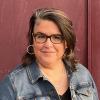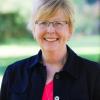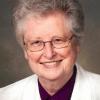"For everyone who asks, receives; and the one who seeks, finds; and to the one who knocks, the door will be opened."
GSR Today - Most people who know me would not consider “frivolous” an apt description. But that’s how I felt when visiting Peru, faced with the realities there and my life here in the United States. I was haunted by the Gospel story of Lazarus and the rich man and the chasm between them, between Celia and myself, the people of Peru and the people of the U.S.
From A Nun's Life podcasts - As Missionaries of Joy, what are some ways that people in circus ministry extend the love of God to others?
Three Stats and a Map - If you’re like Global Sister Report’s U.S. sister liaison, Franciscan Sr. Jan Cebula, on Monday night, you were watching Independent Lens’ documentary about race on PBS. It’s a timely piece – it seems that we’re talking about race now more than we have in decades.
NCR Eco Catholic blog - Catholic sisters extend their care for Earth into a very specific lifestyle choice: Having a vegetarian or vegan diet is gaining popularity. “[Food] tells a lot about your values. It’s a spiritual act because it connects you back to your soul.”
GSR Today - It’s a big thing to understand that you – just as you are – are beautifully and wonderfully created in the image of God. It makes me cherish the work of people like the Kenyan Elizabethan sisters profiled in Melanie Lidman’s latest piece for Global Sisters Report.
One more Lent, one more chance to return to God with all our hearts. How does that happen?
GSR Today - The International Union of Superiors General (UISG), the world’s most representative women religious leadership organization, is moving into a new phase of drawing up a comprehensive strategic plan aimed at revitalizing the group and giving it direction in the coming years.
NCR Today - Sr. Houda Fadoul is a Syrian-Catholic nun who presides over a congregation of women religious near Nebek, Syria. Nebek a city of around 50,000 inhabitants, is 50 miles north-east of Damascus and about the same distance south the ancient Christian center of Homs. There are about 120 Catholic families there, served by one Syrian-Catholic parish and one Melkite parish.
On-site workshop at Naromoru Disabled Children’s Home, run by Elizabethan Sisters, helps build customized prosthetics, braces and walkers for a fraction of the cost of importing materials or finished products.
Related - ‘Show them that they have special abilities’







